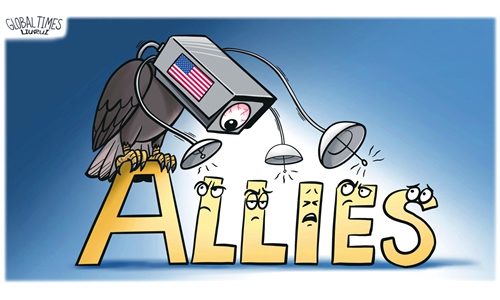
Photo: GT
Editor's Note:
The recent leak of highly classified Pentagon documents is yet another proof that the US is the world's No.1 spying empire. Washington spies not only on its perceived adversaries, but also its allies, which puts the US' foreign relations in jeopardy. How will the leak incident affect allies' "trust" toward the US? Will the US spy on its allies more wantonly?
This is the second article of the "Spying empire" series.
The recent leak of highly classified US intelligence information has shone some light on the kinds of information senior American decision-makers have access to regarding the ongoing conflict in Ukraine, and how this information is collected. One of the many revelations that have come into the public eye is the fact that the US intelligence community has not discriminated when it comes to the targets of its collection efforts - in addition to intelligence snatched from Russian sources, the leaks revealed that the US has been listening in on the conversations of its erstwhile friends and allies.
This reality should not shock anyone who has watched the US operate on the global scene in the past three decades. While the Cold War created an environment conducive to alliances of convenience, where the US gathered like-minded nations in pursuit of the containment of communism, once the Soviet Union collapsed, and America emerged as the sole remaining, uncontested global superpower, these alliances were transformed from bulwarks designed to reign in competition, to institutions intended to sustain American hegemony. As such, when the time came for the US to pursue policy objectives in the international arena, American decision-makers were loath to trust their erstwhile friends to blindly follow.
Instead, the US intelligence community was tasked to gather information on a multitude of targets, whether they be allied, neutral, or in opposition, to know for certain whether the reality of their respective policy matched public posturing and, if not, to find out information that could be used to threaten or cajole nations into aligning themselves with US policy objectives. This was the case in 2003, when a "Top Secret" memorandum from the National Security Agency was made public which detailed a so-called "surge" of intelligence collection against members of the United Nations Security Council to ascertain how each delegation was leaning when it came to the issue of Iraq and the use of military force. The purpose of this effort was, according to the memorandum, "to give US policymakers an edge in obtaining results favorable to US goals or to head off surprises."
A decade later, in 2013, an NSA contractor named Edward Snowden released a trove of highly classified documents outlining systemic violations of constitutionally mandated rights regarding the privacy of US citizens. Many of these documents also exposed the fact that the same intelligence collection capabilities that were being abused by US intelligence to illegally monitor the communications of American citizens were also being used to spy on the conversations of America's closest allies, including the Chancellor of Germany, Angela Merkel. In 2021 new information leaked to the press exposed the fact that the National Security Agency, in cooperation with the Danish intelligence service, was tapping communication cables inside Denmark to listen in on the conversations of political leaders in Germany, France, Norway, and Sweden.
And now the world is confronted, yet again, with the fact that the US continues to listen in on the private conversations of its supposed allies and the need to create a common front against Russia in Ukraine. As was the case regarding Iraq in 2003, today the US finds itself confronting a politically challenging issue over the continued support of Ukraine in a war with Russia that is entering its 14th month where allies mutually and publicly embrace joint policy objectives on the supply of the Ukrainian military, while wresting with the difficulty of maintaining a united front in the face of domestic economic difficulties. The complexities surrounding the nuances that attach themselves to the Ukraine issue are such that often governments make a politically expedient declaration of support while privately offering caveats as to why their rhetoric does not match reality. In this environment, the US intelligence community has been tasked with repeating the intelligence collection "surge" of 2003, discerning the political intent of so-called allies by listening in on their private conversations.
While logic and human nature should dictate that those nations who have been targeted by the US intelligence community would express indignation at the mere thought of their American friends spying on them at the same time the US is looking to construct a durable anti-Russian alliance built on the backs of its so-called friends in Europe and Asia. But for the most part the new revelations have been greeted with a deafening silence.
The reason for this rests in the neo-colonial relationship the US enjoys with much of Europe as well as important parts of Asia, including Japan and South Korea.
The unequal aspect of this relationship is reflected in the realm of intelligence sharing, where most participating nations are almost exclusively reliant upon American technical capabilities that have them complicit in aiding and abetting the collection of intelligence against their neighbors on behalf of the US, while remaining silently indifferent to US trespassing into their own sovereignty. This silence underscores the truth of the matter, which is that, when it comes to the national security of the US, everyone is a target.
The author is a former US Marine Corps intelligence officer. opinion@globaltimes.com.cn

